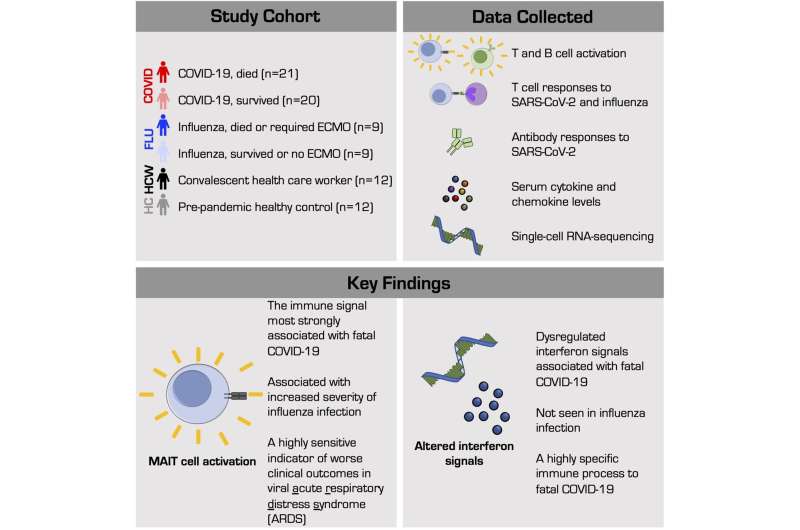MAIT cell activation may play a role in fatal outcomes among severe COVID-19 cases

The mortality rate of COVID-19 patients requiring mechanical ventilation is 30-40%, however, the immunological factors associated with death in critically ill COVID-19 patients are poorly understood. A study published in PLOS Pathogens by Jonathan Youngs at St. George's University of London, United Kingdom and colleagues suggests an association between systemic inflammation responses and increased mortality of COVID-19 patients.
Antibodies and T cells play a critical role in protection from viral illness, however the exact role of T cell and antibody responses in SARS-CoV-2 infection is unclear. To better understand the immune abnormalities linked to critical illness and death in COVID-19 patients on ICU, researchers conducted a prospective observational study investigating the association of T cell and antibody responses with fatal outcome in severe COVID-19. They analyzed serum samples from 41 mechanically ventilated COVID-19 patients, performing immunophenotyping of T cell responses and a range of experiments analyzing antibody responses. They then compared their findings to a parallel set of 18 mechanically ventilated influenza patients, as well as to 12 mild COVID-19 patients and 12 healthy controls.
The researchers found that fatal COVID-19 infections were correlated with poorly coordinated systemic immune responses and elevated mucosal associated invariant (MAIT) cell activation were the strongest predictor of a fatal outcome. However, the study was limited in that it only analyzed samples in a cross sectional manner and did not observe how immune responses changed over the course of the infection. Future studies are needed to explain in depth how mortality-associated immune characteristics may develop over time.
According to the authors, "Our study yields an enhanced understanding of the differential immunopathogenic processes driving critical COVID-19 and influenza, which can translate into improved immunotherapeutic approaches in patients with severe viral pneumonitis."
"In critically ill patients on ICU with COVID-19 and influenza, an unbiased analysis of the antiviral immune response revealed activation of a specific immune subset -Mucosal-associated invariant T (MAIT) cells—as a strong immunological predictor of death," the authors add. "Survival in critical COVID-19 is associated with focused immune responses driven mainly by one cytokine—interferon alpha—in contrast to the very broad pro-inflammatory responses seen in those with fatal disease. This cytokine pattern linked to death versus survival separates critical COVID-19 from influenza."
More information: Youngs J, Provine NM, Lim N, Sharpe HR, Amini A, Chen Y-L, et al. (2021) Identification of immune correlates of fatal outcomes in critically ill COVID-19 patients. PLoS Pathog 17(9): e1009804. doi.org/10.1371/journal.ppat.1009804



















